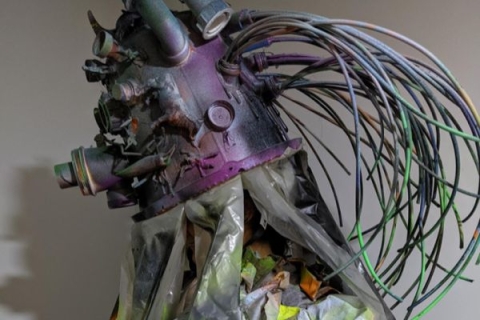

Innovative and creative campaigns that address the root causes of plastic pollution and its impact on climate change in the Global South will be showcased at COP26 in Glasgow this week
5 November 2021
3 min read
Innovative and creative campaigns that address the root causes of plastic pollution and its impact on climate change in the Global South will be showcased at COP26 in Glasgow this week.
Researchers from the University of Portsmouth’s Revolution Plastics initiative will be in the Green Zone exhibition area on Friday 5 November. They will demonstrate how high levels of community engagement, participation and empowerment are being achieved with low cost-creative methods in some of the world’s most affected areas. These creative methods include a stunning life sized ‘Total Trash Talisman’; as well as music videos, films, interactive theatre and social media campaigns.
Dr Cressida Bowyer, Deputy Director of Revolution Plastics said: “Through the use of song, murals, comic books, video, puppetry and theatre, there is an attuning of communications in ways that are more valid and relevant to people. What has been missing are the bottom-up conversations and engagements that are framed around local social and cultural values. You can’t readily achieve solutions without involving communities in the research process and tapping into their knowledge and expertise.”
What has been missing are the bottom-up conversations and engagements that are framed around local social and cultural values.
Dr Cressida Bowyer, Deputy Director of Revolution Plastics
Plastic is known to be a major contributor to climate change at every stage of its lifecyle, from the emission of greenhouse gases during its manufacture to the subsequent pollution from the burning of plastic waste. There’s also the major impact of discarded plastic on ecosystems that are already struggling to deal with rising temperatures.
Cities in the Global South are disproportionately impacted by plastic pollution. Countries that are most vulnerable to the effects of climate change also have the most plastic pollution due to limited waste disposal infrastructures and inadequate management of plastic waste. This is exacerbated by the import of waste from high income countries.
With this in mind, the University of Portsmouth launched its “Sustainable Transitions to End Plastic Pollution” (STEPP) project, which identified opportunities to tackle the problem of urban plastic pollution, focusing on two case study sites in low income countries — Nairobi, Kenya and Sylhet, Bangladesh. STEPP is an interdisciplinary and international collaboration drawing contributions from a wide range of stakeholders, including community activists, artists, local governments, businesses and academia. The project has resulted in a range of creative outputs that aim to inform and empower the local community about plastic pollution in a way relevant to them. The pioneering team from the University of Portsmouth will share experiences and knowledge at COP26.
This kind of creative and performative commentary also demonstrates the power and potential of the arts in effectively communicating in areas with less formal and reliable communication infrastructure.
Dr Louis Netter, Senior Lecturer in the School of Art, Design and Performance
The Revolution Plastics exhibition will be a visual treat - with examples of work currently being undertaken with partners in Bangladesh and Kenya. The ‘Total Trash Talisman’ is inspired by artists in the Democratic Republic of Congo, and has been created from plastic waste around the UK. This plastic monster is designed to shock, amuse and engage visitors to COP26 - in exactly the same way the STEPP creative campaigns are doing in their target areas. The Talisman will be available for interviews and social media appearances under the hashtag #COP26plastics.
Dr Louis Netter, Senior Lecturer in the School of Art, Design and Performance at the University of Portsmouth, said: “This kind of creative and performative commentary also demonstrates the power and potential of the arts in effectively communicating in areas with less formal and reliable communication infrastructure. We are also using similar, community-based creative interventions to communicate public health messages, inform residents of a lung health study and spread awareness and action against plastic pollution.”
Community workers from the Mukuru Youth Initiative will be making a virtual appearance on the stand in Glasgow. A digital link with Mukuru in Nairobi will allow for joint workshops during the COP26 event. They will demonstrate how creative campaigns are being used to reduce the amount of waste in a community that has become overwhelmed by plastic pollution, and creating a plastic monster of their own to duplicate the activities in their own community.
